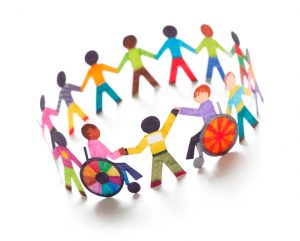Overview
Global-Mark provides certification for both Commonwealth and state-based human services programs and has built significant expertise in the human services and disability sector. We have a stable, skilled and experienced team of staff, client managers and consumer technical experts that audit service providers across Australia. Global-Mark has sound systems to support and assist our auditors, which in turn supports and assists our clients to enhance their organisation’s performance, service quality and participant involvement. Global-Mark is dedicated to our clients, team and community; to helping our community through our clients.
Global-Mark is different, and this is reflected in our structure, culture, systems and our approach in working with you. The certification market is traditionally represented by conventional and conservative organisations and people. Global-Mark wants to be different, and wants our clients to benefit from this difference.
If you would like to know more about our services, please enquire below.
Scheme
Australian Community Industry Certification Scheme
Global-Mark’s Australian Community Industry Certification Scheme is designed to assist care organisations to demonstrate their ability to achieve the industry benchmark, and provide confidence that providers deliver consistent services which continually improve and evolve.
The Australian Community Industry Certification Scheme requires certification to the Australian Community Industry Standards (ACIS 2018), which were developed by the community supports sector, for the community supports sector, to ensure the delivery of quality, community based, person-centred care services. The ACIS 2018 is the only Australian standard developed to address the delivery of care services, which encompass delivery of services to individuals with low to high support needs to live in their community.
Certification to ACIS 2018 is also recognised by a number of funding bodies.
The Australian Community Industry Standards (2018) encompass:
The Essential Level
- Service User Rights and Responsibilities
- Organisational Management
- Service Delivery
- Service Environment
Level 2 Complex Physical Support
- Medication Administration and Management
- Wound Care and Management
- Catheter Care and Management
- Complex Bowel Care and Management
- Enteral (Percutaneous Endoscopic Gastrostomy (PEG), Naso-Gastric Tube – Jejunum or Duodenum) Feeding and Management
- Tracheostomy Suctioning Care and Management
- Ventilator Care and Management
- Subcutaneous Injections
Level 3 Complex Behaviour Support
- Complex Behaviour Support
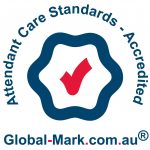
Department of Human Services, Victoria
Global-Mark is a Department of Human Services, Victoria endorsed independent review body that assists department funded service providers to meet certification requirements. The Human Services Standards and governance and management systems standards aim to ensure that services provide quality services, uphold client rights and meet client needs, deliver positive community outcomes, and promote an organisational culture of continuous improvement.
Global-Mark offers certification to the Human Services Standards under JAS-ANZ and ISQua accreditation, by our highly experienced team of Client Managers and Consumer Technical Experts. Certification to the Human Services Standards is a three-year cycle, with at least one mid-cycle maintenance audit.
The Human Services Standards in Victoria consist of:
Standard 1 – Empowerment
Standard 2 – Access and Engagement
Standard 3 – Wellbeing
Standard 4 – Participation
Global-Mark provides certification to the following governance standards:
ISO 9001:2015 (minimum annual audits)
National Standards for Disability Services (mid-cycle audits)
National Safety and Quality Health Service Standards (mid-cycle audit)
Click here to view the Human Service Standards (Easy English)
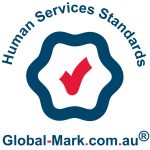
Disability Employment and Enterprise Services
Global-Mark’s Disability Employment and Enterprise Services (DEES) certification scheme is designed to aid disability employment and enterprise services meet the requirements of the Commonwealth Government’s Quality Assurance System. Australian government funded disability employment and enterprise organisations programs are required to have certification to receive funding for programs administered by the Department.
The DEES scheme requires certification to the National Standards for Disability Services (2014) to ensure the elements of quality support are achieved for people with disability receiving employment support from disability employment/enterprise services. The NSDS enable nationally consistent quality standards to apply for the disability services sector. They focus on person-centred approaches and promote choice and control by people with a disability, in line with the requirements of the National Disability Insurance Scheme.
The National Standards for Disability Services (2014) are:
Standard 1 – Rights
Standard 2 – Participation and Inclusion
Standard 3 – Individual Outcomes
Standard 4 – Feedback and Complaints
Standard 5 – Service Access
Standard 6 – Service Management
Click here to view the National Standards for Disability Services (Easy English)
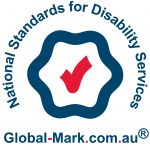
National Disability Advocacy Program
Global-Mark provides certification to the National Disability Advocacy Program, which is designed to meet the requirements of the Commonwealth Government’s Quality Assurance System for organisations providing citizen advocacy, family advocacy, individual advocacy, legal advocacy, self-advocacy or systematic advocacy services. NDAP requires certification against the National Standards for Disability Services (2014), under a three-year certification cycle with annual post certification reviews.
The Department of Social Services defines the program as providing “people with disability with access to effective disability advocacy that promotes, protects and ensures their full and equal enjoyment of all human rights enabling community participation. Advocacy for people with disability can be defined as speaking, acting or writing with minimal conflict of interest on behalf of the interests of a disadvantaged person or group, in order to promote, protect and defend the welfare of and justice for either the person or group by:
• Acting in a partisan manner (i.e. being on their side and no one else’s);
• Being primarily concerned with their fundamental needs;
• Remaining loyal and accountable to them in a way which is empathic and vigorous (whilst respecting the rights of others); and
• Ensuring duty of care at all times.
The National Standards for Disability Services (2014) are:
Standard 1 – Rights
Standard 2 – Participation and Inclusion
Standard 3 – Individual Outcomes
Standard 4 – Feedback and Complaints
Standard 5 – Service Access
Standard 6 – Service Management
Click here to view the National Standards for Disability Services (Easy English)
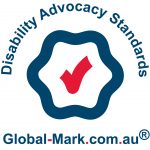
Third Party Verification
In NSW, Third Party Verification is no longer a requirement for NDIS providers providing specialist disability supports since 1 July 2018, and instead NSW providers have transitioned to the NDIS Quality and Safeguarding Framework.
Please see our page on NDIS Approved Quality Auditor Scheme – Certification and Verification for more information.
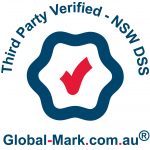
Human Services Quality Framework
Global-Mark’s program is design to assist Queensland government funded registered child safety community care, community and homelessness services achieve certification to the Human Services Quality Framework (HSQF). The HSQF was developed by the Department of Communities, Disability Services and Seniors to safeguard and ensure the efficient and effective provision of services that result in quality outcomes for clients. The Human Services Quality Standards (2012) are based on principles of respecting human rights, social inclusion, participation and choice.
HSQF is a three-yearly certification cycle that requires annual or mid-cycle reviews. Global-Mark has a robust and proficient team of Client Managers and Consumer Technical Experts that audit to the Human Services Quality Framework.
The Human Services Quality Standards (2012) are:
Standard 1 – Governance and Management
Standard 2 – Service Access
Standard 3 – Responding to Individual Needs
Standard 4 – Safety, Wellbeing and Rights
Standard 5 – Feedback, Complaints and Appeals
Standard 6 – Human Resources
Click here to view the Human Services Quality Standards (Easy Read)
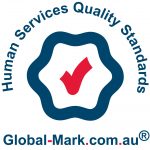
Consumer Involvement in Human Services Audits
Consumers or participants are encouraged to take part in Human Services audits. Service providers should invite consumers to the opening and closing meetings of all audits (as appropriate). Consumers should also be offered information about the audit process and independent support to engage in the process, prior to any consent being obtained.
Participation by consumers in audits is always voluntary and is based on the principle of consent. Consumers will be requested to provide consent to be interviewed by the audit team, as well as have their files reviewed. In most cases, written consent must be provided. Where the capacity of a consumer to provide consent is uncertain, an independent advocate should be involved to determine that capacity, and to support an appropriate level of involvement by the consumer. If there is no written consent obtained, the reason and evidence to support the assumption that consent was sought and was obtained should be recorded in file notes.
